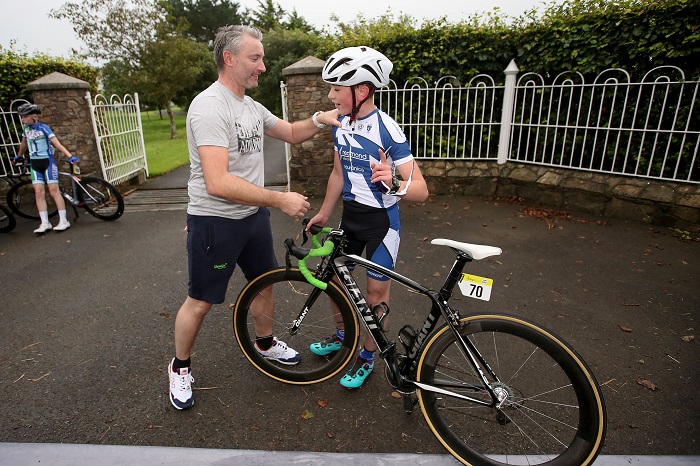
Guideline: Sporting events and matches can continue to take place behind closed doors. In a cycling context this means cycling races on and off-road as well as sportive events can proceed as planned.
- A behind closed doors event can include: ‘Any individual involved in the participation, running, delivery, and broadcasting (if relevant) of the event’.
- The 6 indoor /15 outdoor participant restrictions do not apply to competition, events, or tournaments. The limit for cycling races and sportive events is 200 inclusive of participants and those involved in the delivery of the event.
- NGBs & Clubs with competition, events, tournaments planned up to September 13th 2020 should go ahead as planned with strict public health measures and protocols in place. No Spectators should attend these events. The Cycling Ireland Track National Championships will go ahead as planned on August 29/30. In light of the fact spectators are not permitted, both days of the Championship will be live streamed across social media.
- Parents/Guardians attending in a safeguarding /supervisory capacity are not classified as a spectator however strict social distancing and public health guidelines should be adhered to at all times. In that context, one parent/guardian per child is permitted to attend at a sporting event, including a game or training session, should they consider it necessary. These provisions will be subject to strict protocols which will be issued in the coming days.
Cycling Ireland Covid-19 Guidance posted 19.08.2020
The
Cabinet has agreed a number of new restrictions aimed at curbing the spread of
coronavirus.
The measures
were announced by Taoiseach Micheál Martin on Tuesday, August 18,
effective immediately and will remain in place until 13 September, at the
earliest. The key implications for Cycling Ireland approved events and
activities are as follows.
- Sporting
events and races can continue to take place behind closed doors. In the cycling
context, the new restrictions mean cycling races and events can go ahead but
that spectators are not permitted at these cycling races and/or events.
- Groups
exercising outdoors should be limited to 15 people, including club training
sessions.
- Gatherings, including social gatherings, before or after events must be avoided. Participants should practice 2 metre physical distancing before and after events.
The cycling community must continue to remain vigilant, strictly following public health advice including physical distancing, hand hygiene and cough etiquette.
In addition, Cycling Ireland has launched a COVID-19 Liaison Officer Training Course to support clubs in the return to training. On successful completion of the course, the club’s designated “COVID-19 Liaison Officer” will receive a certificate of completion.
As a further support for clubs, Cycling Ireland’s online contact tracking/booking system is available for managing club training activities and training rides. The easy-to-use online system allows a ride leader to register all those attending a club activity from their smartphone.
Clubs must ensure participants are registered for contact tracing purposes and have completed a self-assessment form.
Sport Ireland Updated Public Health Measures – Sport & Physical Activity
- Sport facilities
can remain open.
- Sporting events and
matches can continue to take place behind closed doors.
- Gatherings,
including social gatherings, before or after events must be avoided.
Participants should practice 2 metre physical distancing before and after
events, during breaks in play, on the sidelines and team huddles should be
avoided.
- Gyms/leisure
centres/swimming pools/exercise and dance studios can remain open with strict
distancing and other appropriate protective measures in place.
- Exercise and dance
classes should be limited to 6 people and observe physical distancing rules.
- Groups exercising
outdoors should be limited to 15 people, including training sessions. There
should be no mixing between groups.
- It is recommended
that those responsible for managing these facilities should have completed a
risk assessment before reopening to manage the public health risk for their
customers, attendees, participants, and staff.
- The assessment
should consider the risk factors for getting COVID-19, that is Distance,
Activity, Time and Environment, and include controls such as managed entry,
improved hygiene facilities, and regular cleaning to limit these.
- Facilities should
observe physical distancing guidelines and apply the public health checklist to
their operation. Guidance on mass gatherings should also be followed.
- Facilities reopening with a return of staff should apply the Return to Work Safely Protocol. This has been designed to support employers and workers to put measures in place that will prevent the spread of COVID-19 in the workplace.
